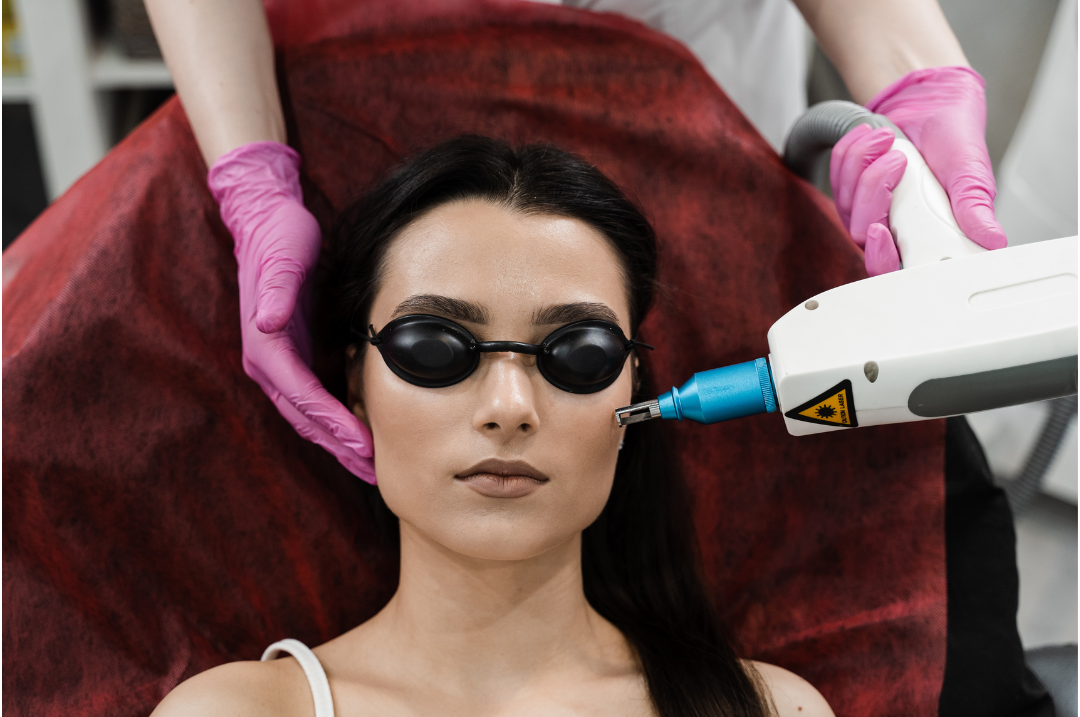“Say Goodbye to Dark Spots: The Ultimate Guide to Pigmentation Treatments”

Guide to Pigmentation Laser Treatment: What You Need to Know
Pigmentation issues like dark spots, melasma, and uneven skin tone are common and can impact your confidence. Laser treatment for pigmentation is an effective solution that can help even out your skin tone, reduce dark spots, and reveal brighter, healthier-looking skin. Here’s everything you need to know about how pigmentation laser treatments work and what to expect.
1. Understanding Pigmentation and Its Causes
Skin pigmentation is caused by an excess of melanin, the natural pigment responsible for our skin color. Factors like sun exposure, hormonal changes, aging, and skin injuries can increase melanin production, leading to dark spots or patches on the skin. Laser treatment targets these areas of excess melanin, helping to fade them and improve skin tone.
2. How Pigmentation Laser Treatment Works
Laser treatment for pigmentation uses concentrated light energy to target and break down excess melanin in specific areas of the skin.Different types of lasers, such as Q-switched lasers, Nd lasers, and fractional lasers, are used based on your skin type and the specific pigmentation issue. The laser specifically targets pigmented cells while leaving the surrounding skin unharmed, breaking down melanin so that the body can naturally eliminate it.
3. Types of Pigmentation Lasers
Q-Switched Lasers: These are ideal for treating deeper pigmentation issues, like melasma, by emitting quick, high-intensity pulses of light to break down melanin.
Lasers: Effective for darker skin tones, these lasers penetrate deeper layers of skin, targeting pigmentation issues without causing damage to the skin’s surface.
Fractional Lasers: These create tiny zones of controlled skin damage, stimulating collagen production and targeting superficial pigmentation while also improving skin texture.
4. The Treatment Process
The laser device is aimed at the pigmented regions throughout the treatment.Patients may feel a gentle warmth or a subtle tingling sensation during the administration of the laser pulses. Treatment sessions usually take 15 to 45 minutes, depending on the size of the area being treated.
Since pigmentation often goes deeper into the skin, multiple sessions are usually required for best results, with each session spaced about 4-6 weeks apart.After 3 to 6 sessions, most patients notice a considerable change.
5. Benefits of Pigmentation Laser Treatment
Reduced Dark Spots: The laser effectively breaks down melanin, reducing dark spots and hyperpigmentation.
Even Skin Tone: Targeting pigmentation at its source helps in achieving a more even skin tone.
Stimulates Collagen Production: Some lasers stimulate collagen, improving overall skin texture and elasticity.
Quick Procedure: Laser treatments are generally quick and have minimal downtime.
6. Aftercare and Recovery
Post-treatment, you may experience mild redness or swelling, similar to a mild sunburn, but these usually subside within a few hours to a couple of days. It’s crucial to protect your skin from the sun, as UV exposure can worsen pigmentation. Use a broad-spectrum sunscreen, moisturize regularly, and avoid picking at any dry or flaky skin.
7. Potential Side Effects and Considerations
While laser treatment is generally safe, side effects can include temporary redness, slight swelling, and in rare cases, mild scarring or changes in skin texture. Individuals with darker skin tones may be at risk for post-inflammatory hyperpigmentation, so it’s essential to work with a qualified dermatologist who can choose the right laser and settings for your skin type.
8. How Do I Know If Pigmentation Laser Treatment Is Right for Me?
Laser treatment is effective for most skin types, but it’s essential to have a consultation with a dermatologist who can assess your skin type and pigmentation level. Certain skin types, especially darker tones, may require a specific type of laser and a customized approach to reduce the risk of side effects.
9. Expected Results
With consistent sessions and proper aftercare, laser treatment can significantly reduce pigmentation, resulting in a more even and radiant complexion. However, results vary by individual, and some people may need maintenance sessions to keep pigmentation from resurfacing.
Final Thoughts
Pigmentation laser treatment is a powerful solution for reducing dark spots, melasma, and uneven skin tone. By consulting a dermatologist, you can determine the best laser type for your skin and create a treatment plan tailored to your needs. With proper care, laser treatments can help you achieve a brighter, more even complexion and restore confidence in your skin!
Goodbye, dark spots – hello, flawless glow! Book a consulation today with professional to get clear and glowing skin! At – AVAN CLINIC
Get in touch
Call Us
+91 996 3535 777
avanbeautyskinandhairclinic@gmail.com
